When you think of hybrid cars, one name has always stood at the forefront: the Toyota Prius. But if you’re picturing the quirky, wedge-shaped car of the 2010s, get ready to forget everything you knew. The 2026 Toyota Prius hybrid is here, and it’s unlike any Prius we’ve seen before. Redesigned from the ground up, the new Prius is sleeker, sharper, and far more dynamic.
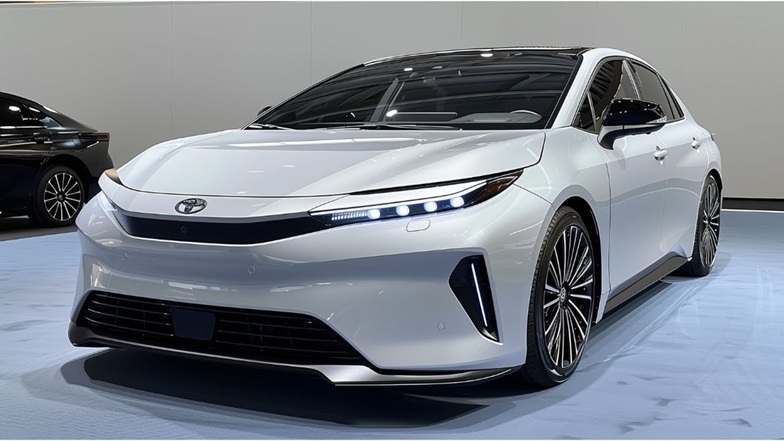
The Toyota Prius—once seen as the symbol of fuel-efficient commuting—has undergone a bold transformation. Welcome to the new era of hybrid driving with the 2026 Toyota Prius. Gone are the days of awkward wedge shapes and conservative design. The new Prius is sleek, sporty, and surprisingly powerful. And yes, it’s still a hybrid icon—but now with attitude. Let’s take a full walkthrough: from its futuristic design and upgraded performance to cutting-edge tech and where it stands in a crowded hybrid market.
Radical Exterior Redesign
The 2026 Toyota Prius doesn’t just look different—it looks futuristic. Toyota has finally done away with the awkward lines of previous generations and replaced them with a more athletic, head-turning design. The front fascia is aggressive, framed by sleek LED headlights and a full-width light bar. The lower, wider stance gives the car a planted and commanding presence.
Around back, the design remains clean and bold. A continuous light strip connects the tail lights, emphasizing the car’s width and adding a premium feel. The glossy black paint option enhances its sporty profile, especially when paired with the eye-catching 19-inch alloy wheels and stealthy black badging. Beyond just style, Toyota has focused on aerodynamics. With a drag coefficient of just 0.27, this Prius is built to slice through air with minimal resistance, boosting both efficiency and performance.
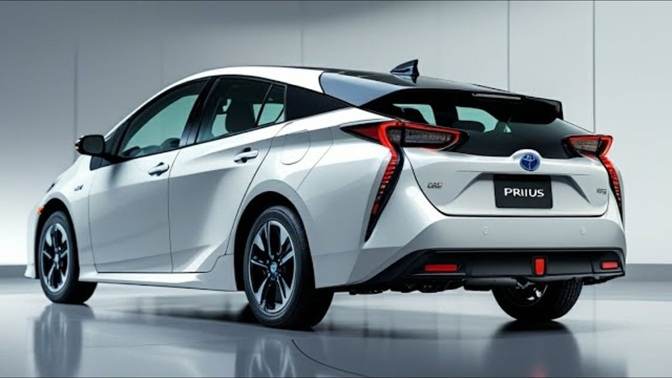
Inside the Cabin: Comfort Meets Tech
Step inside the 2026 Toyota Prius and it immediately feels like a different league from its predecessors. The cabin is a mix of upscale materials and thoughtful design. Soft-touch surfaces cover most contact points, and ambient lighting creates a modern, calming atmosphere. A panoramic glass roof is available on higher trims, opening up the cabin and letting in plenty of natural light.
The dashboard is minimalist yet functional, anchored by a massive 12.3-inch touchscreen infotainment system. It runs Toyota’s latest user interface, complete with wireless Apple CarPlay and Android Auto. Just behind the steering wheel sits a fully digital instrument cluster, giving drivers a clean and intuitive view of all vital information.
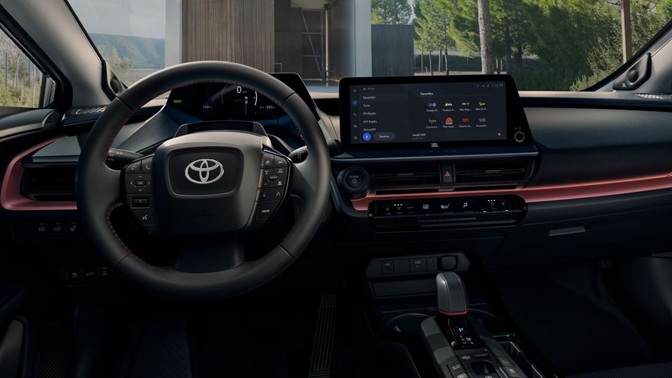
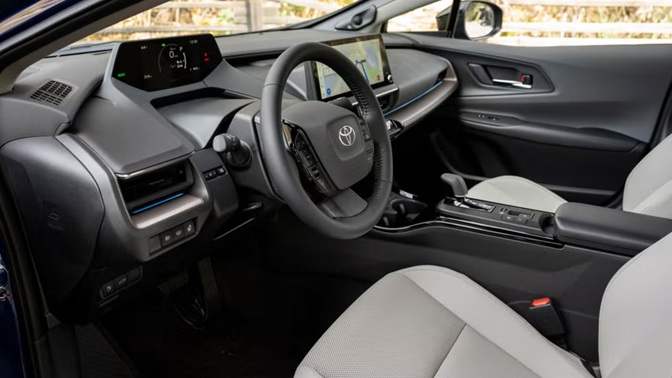
The seats, finished in black with contrast stitching, offer heating and ventilation in the front row. A wireless charging pad, plus several USB-C ports for both front and rear passengers, adds daily practicality. Rear seat passengers get decent legroom, though taller individuals may find the sloping roofline slightly limiting on headspace. Still, the Prius makes the most of its footprint with clever storage and a well-thought-out layout.
Performance That Surprises
If you thought the Prius was just a slow, gas-saving commuter, think again. The 2026 model is powered by a 2.0-liter 4-cylinder engine paired with Toyota’s next-gen hybrid system. In the standard front-wheel-drive version, this setup produces a respectable 196 horsepower.
Opt for the all-wheel-drive Prius Prime, and you’ll get a boost to 220 horsepower. With a 0-60 mph time of just under 7 seconds in the AWD variant, this Prius has some real pep in its step.
The lower center of gravity and improved suspension tuning give it surprisingly agile handling. Steering is responsive and light, making it ideal for both city traffic and weekend getaways. It’s no sports car, but it handles winding roads with a new level of confidence. Fuel economy is still the Prius’ claim to fame, and it delivers big: up to 57 miles per gallon combined in the front-wheel-drive variant, making it one of the most efficient hybrids on the market.
Tech That Makes a Difference
Toyota didn’t just focus on performance and design—the tech upgrades are significant. That 12.3-inch infotainment screen is not only large but impressively fast and easy to use. The system includes voice commands, smart navigation, and even over-the-air updates.
Standard safety features come courtesy of Toyota Safety Sense 3.0, which includes:
- Pre-collision system with pedestrian detection
- Lane-keeping assist
- Adaptive cruise control
- Blind-spot monitoring
- Rear cross-traffic alert
- Optional 360-degree camera system on higher trims
These features combine to make the 2026 Toyota Prius one of the safest hybrids available.
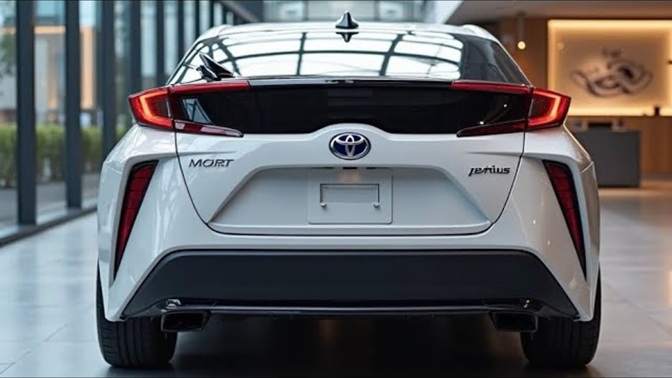
Punchy Performance That Surprises
One of the biggest upgrades? Performance. The standard Prius features a 2.0-liter 4-cylinder engine paired with Toyota’s next-gen 2026 Toyota Prius hybrid system, delivering 196 horsepower. But if you opt for the Prius Prime (plug-in hybrid), you’ll get a bump to 220 horsepower and available all-wheel drive.
That’s good for a 0–60 mph sprint in under 7 seconds in the AWD version. It may not be a sports car, but this new Prius is no slouch. Steering feels accurate, handling is more responsive thanks to a lower center of gravity, and suspension updates mean it’s far more enjoyable on twisty roads than ever before.
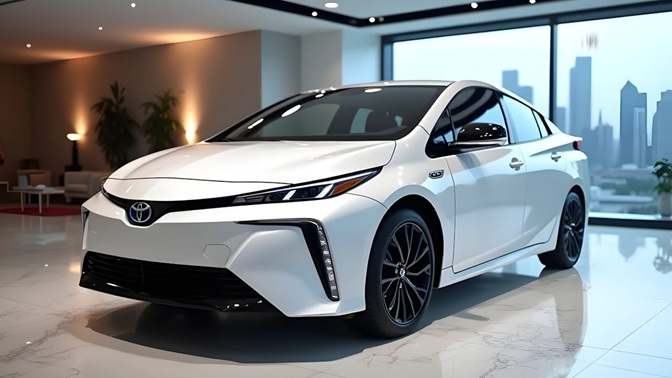
Still a Fuel-Sipping Champ
Despite the performance gains, the Prius keeps its legendary efficiency. The front-wheel drive version delivers up to 57 MPG combined, making it one of the most fuel-efficient cars in the hybrid market. The Prius Prime adds the benefit of plug-in capability, allowing for all-electric city driving and further lowering fuel costs for short commutes.
Trim Levels and Pricing
Despite all the advancements, Toyota has managed to keep the 2026 Toyota Prius competitively priced:
- LE Trim (Base): Starts around $28,000
- XLE Trim: Mid-level option priced between $33,000 and $35,000
- Limited Trim: Fully loaded, costs around $36,000
- Prius Prime (Plug-in Hybrid): Starts at roughly $33,000 and may qualify for federal EV tax credits
Safety and Tech Features
Safety comes standard with Toyota’s Safety Sense 3.0, which includes:
- Pre-collision system with pedestrian detection
- Lane departure alert with steering assist
- Full-speed dynamic radar cruise control
- Blind spot monitoring
- Rear cross-traffic alert
- Available 360-degree surround-view monitor
Market Position: Prius vs. the Competition
The hybrid segment is heating up, and the 2026 Toyota Prius is stepping up to dominate once again. Here’s how it stacks up:
| Model | Horsepower | MPG (Combined) | Starting Price | AWD Available | EV Range (Plug-in) |
|---|---|---|---|---|---|
| Toyota Prius | 196–220 | Up to 57 MPG | $28,000 | Yes | ~44 miles (Prime) |
| Hyundai Ioniq | 139 | 58 MPG | $24,000 | No | ~29 miles (PHEV) |
| Honda Insight | 151 | 52 MPG | $26,000 | No | No PHEV option |
| Kia Niro Hybrid | 139 | 53 MPG | $27,500 | No | ~33 miles (PHEV) |
The Prius now brings stronger horsepower, class-leading MPG, optional AWD, and the longest EV range in its plug-in variant—making it a leader in tech, efficiency, and versatility.
While the Hyundai Ioniq remains competitive in MPG, it lags in power and AWD. The Honda Insight, though refined, doesn’t offer a plug-in version. The Kia Niro is close in price and range but lacks the Prius’s premium interior and safety tech. Toyota has clearly positioned the Prius to be the benchmark in this segment, offering a dynamic blend of performance, efficiency, and innovation.
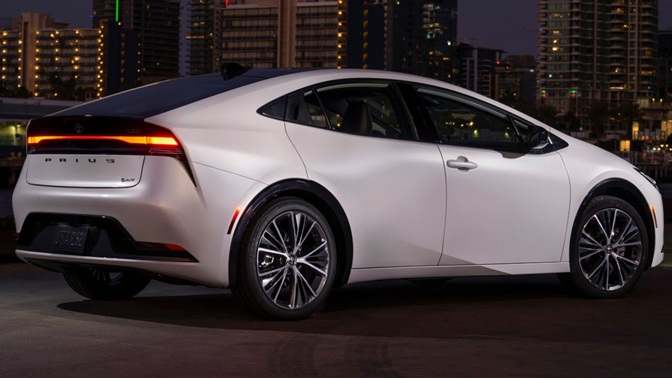
2026 Toyota Prius Specs
| Category | Details |
|---|---|
| Powertrain (Standard) | 2.0L Inline-4 + Hybrid System (FWD) |
| Power Output | 196 hp (Standard Hybrid) |
| Powertrain (Prius Prime) | 2.0L Inline-4 + Plug-in Hybrid System (AWD) |
| Power Output (Prime) | 220 hp |
| Transmission | Electronically Controlled CVT (eCVT) |
| 0–60 mph (AWD Model) | ~6.7 seconds |
| Fuel Economy (FWD) | Up to 57 mpg (Combined) |
| Drive Options | FWD (Standard) / AWD (Prius Prime) |
| Battery Type | Lithium-Ion |
| Charging (Prius Prime) | Level 2 (240V) — ~4 hours to full charge |
| Instrument Cluster | Fully Digital Display |
| Wheels | 19-inch Alloy (higher trims) |
| Cargo Space | ~20.3 cu-ft (behind rear seats) |
| Drag Coefficient | 0.27 Cd |
| Starting Price (Est.) | ~$28,000 (Base) |
| Top Trim Price | ~$36,000 (Limited / Prius Prime) |
With the 2026 Toyota Prius Prime, you get all the perks of a hybrid plus the ability to drive short distances on electricity alone. It’s perfect for daily commuters looking to further reduce fuel use without going full EV.
The 2026 Toyota Prius isn’t just a solid hybrid—it’s a statement. Toyota has redefined what this iconic nameplate means by blending bold design, cutting-edge tech, and surprising performance with world-class efficiency.
Whether you’re a long-time hybrid fan or someone who previously dismissed the Prius as boring, this model demands a second look. It’s sleek, fast (enough), tech-savvy, and practical—all while still delivering the unmatched fuel economy the Prius name is known for. In a world where hybrids are no longer niche, the 2026 Prius proves that innovation never goes out of style. Would we recommend it? Absolutely. If you’re looking for a futuristic, feature-rich, and fuel-efficient ride with Toyota’s legendary reliability, the 2026 Prius is ready to impress.
Related Post
